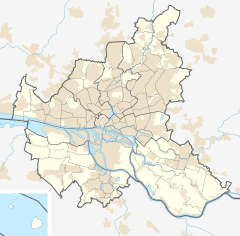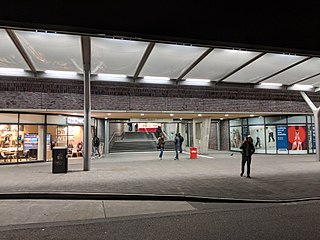
The Hamburg S-Bahn is a rapid transit railway system in the Hamburg Metropolitan Region. Together, the S-Bahn, the Hamburg U-Bahn, the AKN railway and the regional railway form the backbone of railway public transport in the city and the surrounding area. The network has operated since 1907 as a commuter rail system, under the direction of the state railway, and is a member of the Hamburger Verkehrsverbund. There are four lines, serving 68 stations, on 147 kilometres (91 mi) of route. On an average working day the S-Bahn transports about 590,000 passengers; in 2010 about 221 million people used the S-Bahn.

The Hamburg U-Bahn is a rapid transit system serving the cities of Hamburg, Norderstedt, and Ahrensburg in Germany. Although referred to by the term U-Bahn, most of the system's track length is above ground. The network is interconnected with the city's S-Bahn system, which also has underground sections. It is operated by Hamburger Hochbahn within the Hamburger Verkehrsverbund (HVV). It was opened in February 1912, and comprises four lines serving 93 stations, with a route length of 106.4 kilometres (66.1 mi) in 2019.

Hamburger Hochbahn AG (HHA), founded in 1911, operates the underground system and large parts of the bus system in Hamburg, Germany. Its name comes from the initial name given to the Hamburg metro system, Hochbahn.

Hamburg Hauptbahnhof, or Hamburg Central Railway Station in English, is the main railway station of the city of Hamburg, Germany. Opened in 1906 to replace four separate terminal stations, today Hamburg Hauptbahnhof is operated by DB Station&Service AG. With an average of 550,000 passengers a day, it is Germany's busiest railway station and the second-busiest in Europe after the Gare du Nord in Paris. It is classed by Deutsche Bahn as a category 1 railway station.

Holstenstraße is a railway station in Hamburg, Germany, located in the quarter of Altona-Nord in the borough of Altona. It is served by the rapid transit trains of the Hamburg S-Bahn. The station is managed by DB Station&Service.

Sternschanze is a rapid transit station for the trains of Hamburg S-Bahn lines S2 and S5 and Hamburg U-Bahn line U3. The railway station is located in the quarter Sternschanze in the Hamburg borough of Altona, Germany. North of the railway station is a bus stop for the terminating HHA bus route 181.
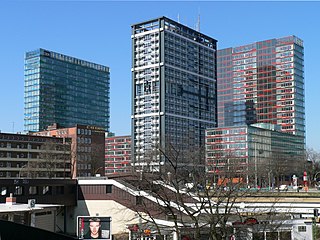
Berliner Tor is a transport hub in Hamburg, Germany, served by the Hamburg U-Bahn and the Hamburg S-Bahn. The station is located in St. Georg, part of the borough of Hamburg-Mitte.

Jungfernstieg is an underground railway station in the city centre of Hamburg, Germany, served by the underground railway (U-Bahn) and the suburban railway (S-Bahn). The station is one of Hamburg's busiest rapid transit hubs.

Hamburg-Harburg or Harburg is one of four operational main-line railway stations (Fernbahnhöfe) in the city of Hamburg, Germany. Opened on 1 May 1897, it is situated on the Hannover-Hamburg, Wanne-Eickel-Hamburg and Lower Elbe lines as well as the Harburg S-Bahn line. Train services are operated by Deutsche Bahn and Metronom with the rapid transit station being served by the Hamburg S-Bahn. The station is managed by DB Station&Service.

Stadthausbrücke is an underground railway station, on the City S-Bahn line of the Hamburg S-Bahn. The station is located in New Town quarter of the Hamburg borough of Mitte (centre), Germany. The station is managed by DB Station&Service.
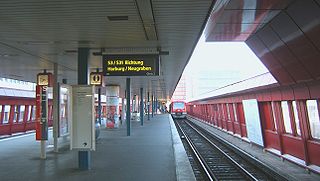
Hammerbrook is an elevated railway station on the Harburg S-Bahn line, served by the city trains of Hamburg S-Bahn. The railway station is located in Hammerbrook, Hamburg-Mitte, Hamburg, Germany.

The underground station Meßberg is located in the city centre of Hamburg, Germany in the Altstadt quarter. It is served by the rapid transit trains of the line U1 of the Hamburg U-Bahn. The station is managed by the Hamburger Hochbahn, the operator of the underground railway.

Veddel (BallinStadt) is a rapid transit station on the Harburg S-Bahn line and served by the trains of Hamburg S-Bahn. The railway station is located in the Veddel, Borough of Hamburg-Mitte, Hamburg, Germany. The station is managed by DB Station&Service, a subsidiary of the German railway company Deutsche Bahn AG. The station is listed as a Halt point (Haltepunkt), a passenger stop situated on an open stretch of line, and lacking specific signals.
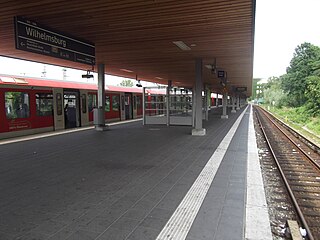
Wilhelmsburg station is a rapid transit station on the Harburg S-Bahn line and is served by trains on the Hamburg S-Bahn network. The railway station is located in the quarter Wilhelmsburg in the Hamburg-Mitte borough of the Free and Hanseatic City of Hamburg, Germany.

Ohlsdorf is a railway station in Hamburg, Germany, located at the junction of the Hamburg-Altona link line with the Alster Valley line and the Hamburg Airport line in Ohlsdorf, Hamburg near the Ohlsdorf Cemetery.
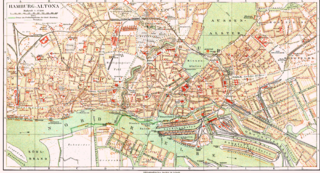
The Hamburg-Altona link line is a railway line in Hamburg, Germany. Nowadays, it connects the lines from the north and northwest of Hamburg and Altona station with Hamburg Hauptbahnhof and the lines to the southwest, south and east. Initially designed as a freight line only, it is now one of the busiest lines in Germany. It includes the suburban tracks of the Hamburg Stadtbahn, originally the core of the Hamburg S-Bahn.

Kellinghusenstraße is a public transport railway station for the rapid transit trains of Hamburg U-Bahn lines U1 and U3 It is located in the Hamburg, Germany quarter of Eppendorf, in the borough of Hamburg-Nord.

Rübenkamp is a station on the Hamburg-Altona link line and served by the trains of Hamburg S-Bahn line S1. The station is also known as Rübenkamp , due to its proximity to City Nord. It was opened in 1913 and is located in the Hamburg district of Barmbek-Nord, Germany. Barmbek-Nord is part of the borough of Hamburg-Nord.

is a quarter of Hamburg, Germany, in the borough of Hamburg-Nord. It is located in the east of Hamburg-Nord, approximately five kilometers from Hamburg city center. Barmbek-Nord is a densely built-up area.
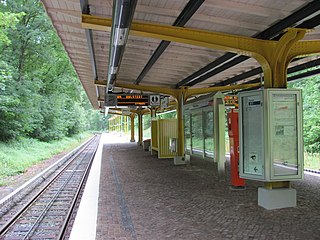
Buckhorn is a station in Volksdorf on the Hamburg U-Bahn line U1. It is located on the Ohlstedt branch of the line.

